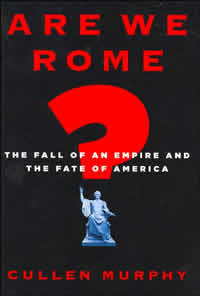Book Notes
 Cullen Murphy, Are We Rome? The Fall of an Empire and the Fate of America (New York: Houghton Mifflin, 2007), 262pp.
Cullen Murphy, Are We Rome? The Fall of an Empire and the Fate of America (New York: Houghton Mifflin, 2007), 262pp.
Comparisons between Rome and America are as old as our founding fathers, and thus the picture of Horatio Greenough's marble statue of George Washington on the cover of this book; he looks like a Roman caesar in his toga. Today "triumphalists" celebrate the comparison and want to export America as a model to the world, while "declinists" lament the similarities and warn about over-extension, arrogance and fall. But are we Rome? Murphy, former managing editor of the Atlantic Monthly for twenty years and currently editor at large for Vanity Fair, stakes a middle ground: "In a thousand specific ways, the answer is obviously no. In a handful of important ways, the answer is certainly yes" (p. 197).
After a short prologue, Murphy devotes one chapter each to six parallels of "direct relevance" between ancient Rome and modern America. Both empires exhibit the symptoms of solipsism—an exaggerated self-identity, the isolating effects of exceptionalism, ignorance of others, the presumptions of privilege, and sheer arrogance. Militarism characterizes both societies. Today America has 700 bases in 60 countries, and in any one year will conduct "operations" of some sort in 170 countries. Murphy suggests that our military is both "too large to be affordable, and too small to do everything it is asked to do." He then turns to how America has blurred the distinctions between the private and public (government) sectors, "the deflection of public purpose by private interest." Outsourcing government responsibilities might be effective and even necessary, but selling the public good for private profit isn't. The fourth parallel between Rome and America is the disdain with which both view outsiders ("barbarians") as inferior. Fifth, Murphy explores the complex notion of borders, both literal (eg, immigration) and figurative. Finally, in his epilogue he examines the "inherent complexity" of large empires like Rome and America. Are they ungovernable?
Rome's empire lasted for a thousand years, and in many obvious ways its "decline and fall" did not mean it simply disappeared. When I have traveled to places like Egypt or China that have had continuous civilizations for thousands of years, and consider that America is just 200 years old—barely a blip on the graph of historical time—I resonate with historically-minded intellectuals like Murphy and their "brutal reminder of impermanence." I find it hard to imagine what America might look like a mere thousand years from now. For his part, Murphy is not overly pessimistic; he urges the country to be more rather than less like the America our founders imagined.


